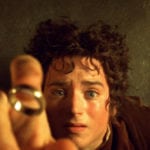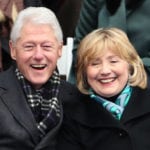 Mysteries
Mysteries  Mysteries
Mysteries  History
History 10 Surprising Stories About the Texas Rangers
 Humans
Humans 10 Philosophers Who Were Driven Mad by Their Own Theories
 Miscellaneous
Miscellaneous 10 Video-Game-Worthy Weapons and Armors from History
 Weird Stuff
Weird Stuff 10 Psychics Who Accurately Predicted Wartime Events
 The Arts
The Arts 10 Pieces of Art Inspired by a Broken Heart
 Health
Health 10 Science Fiction-Sounding New Medical Treatments
 History
History 10 Surprising Facts About the Father of Submarine Warfare
 Space
Space Ten Astonishing New Insights into Alien Worlds
 Weird Stuff
Weird Stuff 10 Bizarre Summer Solstice Rituals Still Practiced Today
 Mysteries
Mysteries Top 10 Haunting Facts About the Ghost Ship MV Alta
 History
History 10 Surprising Stories About the Texas Rangers
 Humans
Humans 10 Philosophers Who Were Driven Mad by Their Own Theories
Who's Behind Listverse?

Jamie Frater
Head Editor
Jamie founded Listverse due to an insatiable desire to share fascinating, obscure, and bizarre facts. He has been a guest speaker on numerous national radio and television stations and is a five time published author.
More About Us Miscellaneous
Miscellaneous 10 Video-Game-Worthy Weapons and Armors from History
 Weird Stuff
Weird Stuff 10 Psychics Who Accurately Predicted Wartime Events
 The Arts
The Arts 10 Pieces of Art Inspired by a Broken Heart
 Health
Health 10 Science Fiction-Sounding New Medical Treatments
 History
History 10 Surprising Facts About the Father of Submarine Warfare
 Space
Space Ten Astonishing New Insights into Alien Worlds
 Weird Stuff
Weird Stuff 10 Bizarre Summer Solstice Rituals Still Practiced Today
10 Creepy Pop Culture Conspiracy Theories
We here at Listverse enjoy discussing conspiracy theories on a somewhat regular basis. Especially, especially if it really seems like it could be true. But we’ve barely even scratched the surface, because the world of show-business has some of the weirdest conspiracies of all.
10 Orson Welles
Prank Broadcast Was Psychological Warfare
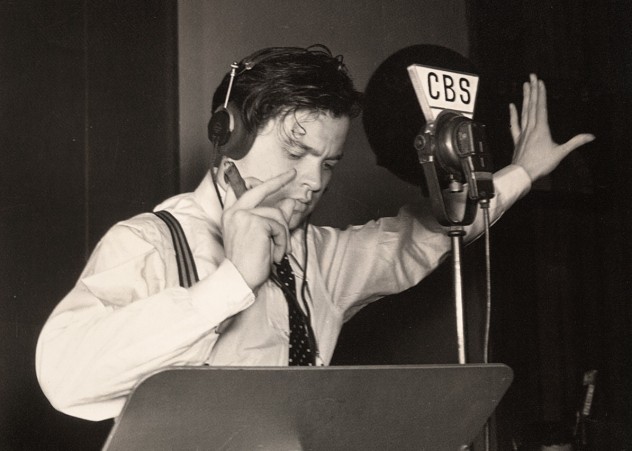
The infamous Halloween Eve radio broadcast of War Of The Worlds has long been part of pop culture folklore. That night in 1938, Orson Welles panicked the nation with a mock news broadcast depicting a deadly alien invasion, and the power of the media was revealed to the world. But, according to one conspiracy theory, the panic was no accident.
It is known that the Princeton University Radio Research project—funded by the Rockefeller Foundation, in order to study the effects of media on society—published a study on the broadcast. The conspiracy theory asserts that the foundation—and therefore, the Rockefellers, who figure prominently in a wide array of theories—actually hired Welles to produce the broadcast with the intent of studying how the populace would react in the event of a genuine invasion (alien or otherwise). Tellingly, the study found that fully 25 percent of the six million listeners thought a real invasion was taking place, although most believed the invaders to be not aliens, but Germans.
9 Deaths Of Famous Actresses
Marilyn Monroe, Natalie Wood Murdered
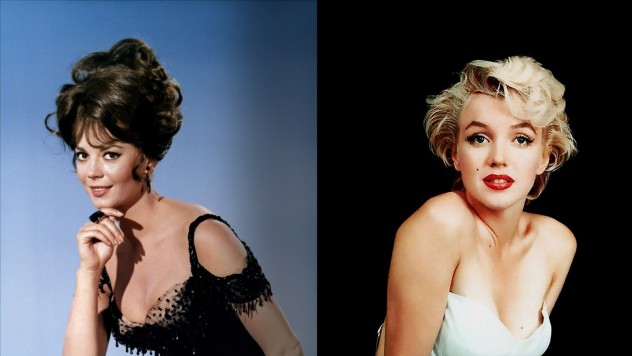
While theories abound concerning any celebrity who dies young, two cases in particular have stuck in the public imagination in ways that few do: the deaths of Marilyn Monroe (in 1962) and Natalie Wood (in 1981). Monroe’s death was a suicide, Wood’s a tragic boating accident—but that’s only if you believe the official line and Los Angeles coroner Thomas Noguchi.
While Marilyn’s suicide was generally accepted by the public (she was troubled, getting old for an actress (at 36), and the story fit her tragic image), later revelations about her involvement with the Kennedy family cast a retroactively suspicious pall over her death. Theories about the exact nature of that involvement vary almost as widely as theories about John F. Kennedy’s assassination, but the most prominent is that it was a Mafia hit at the behest of Robert Kennedy to keep her from revealing her affairs with Robert, John, and even Ted. As for Wood, theories around her death (while aboard a yacht with husband Robert Wagner and actor Christopher Walken) were not much more than idle rumors and innuendo. That is, until the yacht’s captain, Dennis Davern, published a book in 2008 which suggested that the “accident” came close on the heels of a fight with Wagner. Speculation intensified when police reopened the case with little public comment in 2011, but so far, the theories remain just that.
Interestingly, the Los Angeles County coroner on Wood’s case—so-called “coroner to the stars” Thomas Noguchi—was a deputy coroner on the scene when Monroe died almost 20 years earlier. But the case that made him and his team famous (as he told them it would) was the assassination of Robert Kennedy, at LA’s Ambassador Hotel in 1968.
8 John Lennon’s Death
Killer Was Mind-Controlled CIA Assassin
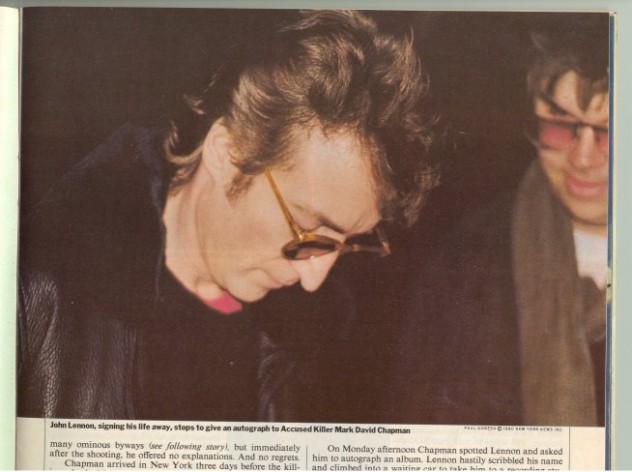
The prototypical crazed stalker assassin, Mark Chapman shot John Lennon to death outside the Dakota apartment building on December 8, 1980. Beside the fact that he had just murdered one of the most famous and beloved figures in the world for no apparent reason, there were a few indicators that something was not quite right with Chapman: for one, the voice he claimed to hear in his head repeating “do it, do it.” For another, the battered copy of Catcher In The Rye he was clutching as he sat waiting for the police, with one sentence scrawled on its inner front cover: “This is my statement.”
Only three years earlier, there had been Senate hearings following the disclosure of the American CIA’s project MKULTRA. One of the admitted goals of this project was brainwashing; specifically, it was alleged that one of the primary purposes of MKULTRA was to produce a “Manchurian Candidate,” a mind-controlled assassin. One subjected to such treatment would display odd behavior indeed (as would somebody who is simply crazy, but we digress), and Chapman is not the only crazed shooter to display an odd fascination with Catcher In The Rye. But why would the powers that be want to kill Lennon?
Well, because he was a peace activist. Lennon was known to oppose the US war in El Salvador, and it’s even been suggested that his benefit concert for activist John Sinclair in 1971 had first gotten him on the wrong side of American intelligence agencies. It’s easy to see why this theory has legs. For his part, Chapman says that he killed Lennon for the notoriety, telling his parole board that society is so celebrity-obsessed that he’s surprised they’re not killed by crazy people more often.
7 Gangster Rap
Conference Promotes Genre For Horrifying Reasons
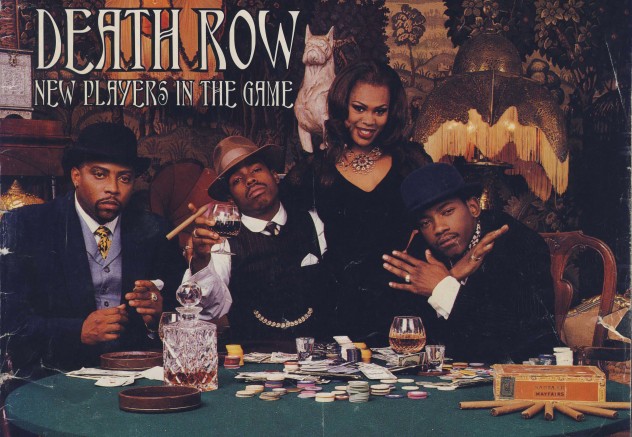
In the late ’80s and early ’90s, rap music was beginning to form pretty distinct sub-genres; the two most popular, in direct opposition to each other, being “conscious rap” (like Public Enemy and A Tribe Called Quest) and “gangsta rap” (like N.W.A. and the Geto Boys). But in a few short years, conscious rap had largely disappeared, while gangsta rap went on to dominate not just rap, but popular music in general. In April of 2012, a letter was posted to the blog Hip-Hop Is Read positing a breathtakingly simple and perfectly chilling explanation for this.
The letter’s anonymous author claimed to be a music industry “decision maker” who was present at an invite-only meeting of like types in 1991. The purpose of the meeting was to discuss the new direction of rap music, at the behest of a small group of people—also present at the meeting—who represented the private prison industry. The general idea was to begin almost exclusively promoting music that glamorizes criminal behavior, with gangsta rap being an obvious choice, in order to keep ghetto youth doing drugs and shooting each other—and keep those prisons filled. It’s also suggested that conscious or political rap was hurriedly phased out at this point, since it would have been counter-productive to this goal.
Of course, due to the signing of a non-disclosure agreement (under heavily implied threat of violence), the letter’s author can offer no verifiable details. The letter also fails to take into account the fact that gangsta rap’s core audience consists of suburban white kids, who relate to its images of violence and drug use in much the same way that they relate to similar images in action movies and video games (that is to say, as pure escapism). But to those who wondered just why violent, misogynistic rap suddenly took over in the mid-’90s (and continue to wonder why it dominates to this day), this theory offers a disturbingly plausible account of how it might have happened and why.
6 Predictive Programming
TV, Movies, Books Hint At Events To Come
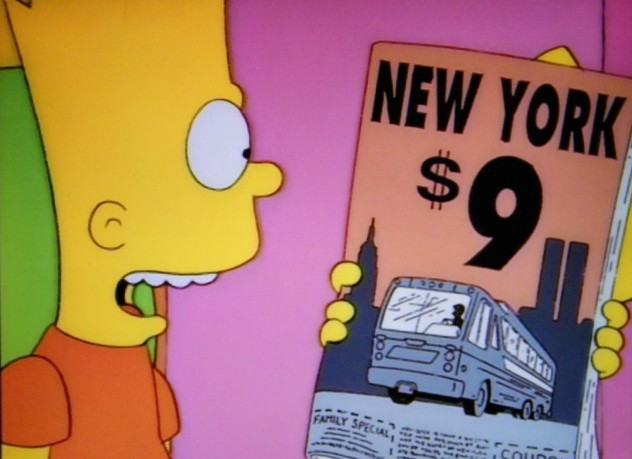
One common theme in conspiracy theories has to do with the behind-the-scenes puppet masters being fond of dropping lots of clues about their master plan, usually in plain sight. These clues almost always have to do with significant symbols, numbers, or other identifiable references to the occult, Freemasonry (the Masons being a gigantic target for conspiracy theories of all sorts), or specific dates or imagery.
This can supposedly be done in many ways (in architecture, for instance, or artwork), the most modern of which is what’s known as predictive programming. For example, the above still, from a 1997 episode of The Simpsons, appears to put that “9” in a pretty strange place, right next to the image of the Twin Towers (which could be seen as an “11”). There are far too many potential examples of this to list here, with some obviously reaching pretty far to make the connections, and others being downright creepy—like the plot of the 1998 pilot of the short-lived Fox series The Lone Gunmen, which had government operatives hijacking a plane and crashing it into the World Trade Center.
Beyond flaunting their nefarious plots, predictive programming is said to play a role in softening up the public for the traumatic events that they predict, in ways that are undetectable to those being affected.
5 Subliminal Messages
Tactic Is Used To Condition Consumers
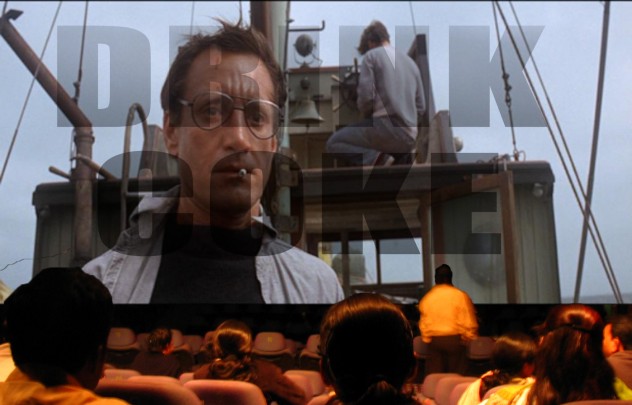
It’s no secret (at least, not anymore) that extremely brief or cleverly hidden words or images can be placed within another image or film in such a way that the observer, while not making a conscious connection, is subtly mentally influenced by the message. The efficacy of this tactic has long been open for debate and has never been proven—but of course, this doesn’t stop corporations from doing things like hiding images within their logos to try to bolster positive association with their brand. It may not work, but it can’t hurt, right?
But according to this conspiracy theory, not only does subliminal messaging work, it works far more efficiently than we’ve been led to believe—and it’s everywhere. Supposedly (and honestly, you really can make the case), the practice is mostly used in advertising to induce consumers to buy, usually with references to sex. Certain Coke and Pepsi ads in the early ’90s were famously found to contain hidden sexual references (which the companies both claimed were coincidences).
One would think that, if effective, the only message necessary in subliminal advertising would fall right along the lines of “buy this product, and lots of it.” But the subliminal sexual references, odd as they may seem, are not limited to advertising. Whether coincidental or some animator’s idea of a joke, it’s also been established that hidden references to sex appear with alarming frequency in Disney cartoons. Which brings us to . . .
4 Walt Disney
The Disney Company Is An Evil Empire
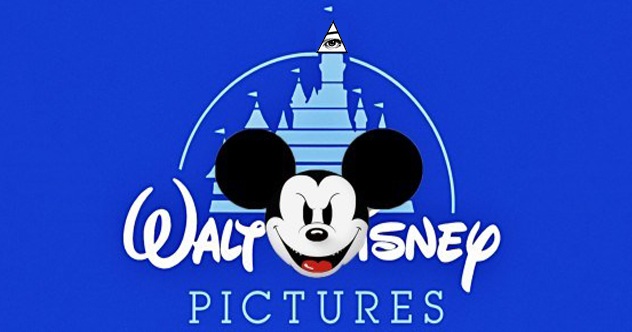
This cannot be disputed: the Walt Disney Company is one of the United States’ oldest and most successful entertainment conglomerates. It was founded in 1923, and as of this writing consists of a certifiably insane number of subsidiaries. Disney has long owned the ABC network and all of its affiliated networks, including ESPN. The company made international headlines in 2009 when it acquired Marvel Entertainment for over US$4 billion, and again in 2012 when it acquired Lucasfilm for over US$4 billion more. The “House of Mouse” is probably the most influential and powerful of the tiny handful of huge corporations that control most of the media in the United States and, by extension, the world.
It also can’t be disputed that, though a traditionally family-oriented business, Disney has allowed sexual images to make their way not only into completed cuts of their films, but also promotional and poster artwork. Many instances have been pointed out, from the overt (a couple of frames showing an image of a topless woman in The Rescuers) to the puzzling (a spire of the castle on the VHS cover of The Little Mermaid looks a hell of a lot like an erect penis) to the questionable (at one point in Aladdin, the Genie can be heard muttering offscreen something that sounds like “good teenagers, take off your clothes”). In each and every instance, changes were made to further releases, and chalked up to jokes by animators or simple misunderstandings. Why would Disney want to expose children (so to speak) to inappropriate sexual content, anyway?
Well, conspiracy theorists have their answers: Disney is all about sexualizing children. The Disney Company, they assert, wants to suck all of the money from the parents’ wallets while rendering their children compliant, subservient consumers, and early exposure to these sexualized images is the first step in that process. Also, they say, because it’s evil—mind-bogglingly, Satanically evil. And here is where some of the theories begin to tie in with each other, and the rabbit hole begins to look pretty deep, so please stay with us.
3 Monarch Mind Control
Most Celebrities Are Mind-Controlled Puppets
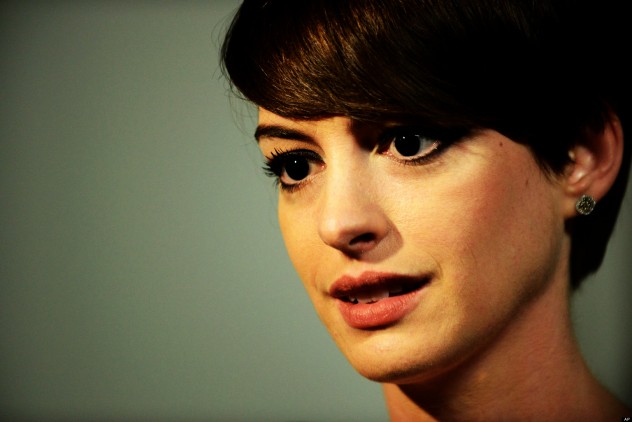
When MKULTRA was exposed in the mid-1970s, the CIA claimed that the program, begun in 1950, had long since been scrapped and had produced no viable results. But some conspiracy theorists will take issue with both of those statements: they’ll say that attempts by the “power elite” to perfect mind control predate the CIA to at least the 1930s. They also say that MKULTRA never stopped, it just changed its name to “Monarch” and not only has it been perfected, but practically all of the world’s most famous celebrities have participated. Especially those employed by Disney.
The programming supposedly consists of ritualized, regulated trauma and abuse, designed to cause the subject to “dissociate” and undergo a break from reality. Then, the “handler” is able to wall off and create multiple personalities—blank slates which can be programmed for a variety of purposes, like singing and dancing. Or killing. Or sex. Or all of the above.
According to the theory, this programming usually begins in fairly early childhood, sometimes with the direct cooperation of the parent. The subjects are used throughout their childhood and teens as sex slaves for the rich and powerful, and their public images are carefully nurtured. These images are plotted on a trajectory from squeaky-clean child star, to subtly sexualized teen idol, to full-blown object of desire (like Lindsay Lohan or Britney Spears, both of whom were working for Disney as children). When such celebrities “melt down” (display bizarre public behavior), it’s not simply the pressures of stardom, but broken mind-control programming. And they don’t go off to rehab, but to be reprogrammed.
If it sounds like science fiction, consider the puzzling fact that Roseanne Barr once inexplicably blurted out—in the middle of an otherwise perfectly normal nationally televised live interview—that “MKULTRA mind control rules in Hollywood. If you don’t know, Google that and look into it.” Of course, we’d like to briefly point out that mind control should not be necessary in order to get young people to sing and dance for millions of dollars, but we digress. Because the rabbit hole eventually leads to where most rabbit holes lead.
2 The Illuminati
Aliens Control Music, All Entertainment

For being little more than a Bavarian social club that disbanded in 1785, the Illuminati have taken a lot of crap over the years for supposedly orchestrating everything bad to ever happen to any group of people at any point in time. And for such a shadowy organization, there certainly seems to be a wealth of information about their sinister agenda available to anyone with an Internet connection. You may have recently heard rumblings about Lady Gaga being a tool of the Illuminati, and laughed and laughed, because that is ridiculous. Until you consider the blatantly obvious occult symbolism in her videos.
No, really. It just kind of goes on and on: the “all-seeing eye” symbolism, the “Baphomet” poses—countless aspects of her stage shows, videos, and promotional photos are said to reflect her status as an Illuminati puppet. But by no means is this limited to Gaga: much of the same symbolism appears in videos by other female artists, like Katy Perry, Beyonce and (of course) Britney Spears. For that matter, it’s not even limited to music. Illuminati/occult symbolism is said to be found all over popular culture, appearing in movies and books as well.
But why? Why use mind-controlled sex slaves to sell sex to a sex-starved public, while admitting the whole thing through a complex series of hidden symbols and imagery? Once again, conspiracy theorists are glad you asked.
1 Mass Media
Media Programs Our Thoughts

Consider the very first entry on the list, which some will tell you was a psychological experiment conducted to see the potential impact that mass media could have on the psyche and behavior of the populace. If we accept this to be even partially true, then it stands to reason that a great deal was learned from that experiment, and that the gist of the conclusion may have been this: the public is far more susceptible to manipulation by mass media than anyone ever could have dreamed. It also stands to reason that this knowledge would be employed early and often by those seeking to manipulate public opinion—like politicians and advertisers.
We indisputably live in a society where social norms and behaviors are taught to us largely by the media, from a very early age. We’re taught to trust what we see and hear, and according to something of a Grand Unified Theory of pop culture conspiracies, that is no accident. We’re very carefully conditioned from birth to consume, think, and behave in predictable ways. And while movies are great for conditioning social behavior, and music is great for instilling desirable (that is, terrible) values and morals, it’s network television that they say really plays a role in shaping your reality, your expectations of life, yourself, and others.
Which, of course, may all be a coincidence. And while we find it much more likely that social science is very weird, that those with a lot of money and power tend to behave badly in the service of getting more of those things, and that being famous tends to make people kind of crazy—what can we say? We love a good conspiracy theory.
